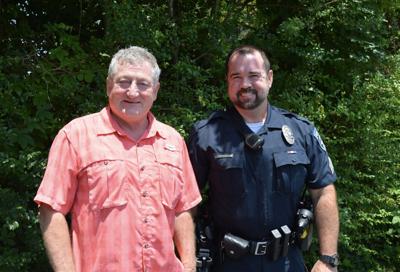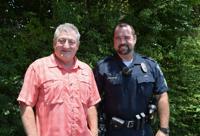Police shootings take a mental toll on all involved. Whether a victim themselves, a relative, part of a marginalized group likely to face police violence, or an officer, someone involved in a shooting will often suffer trauma-induced stress.
In recent years, police departments in particular have organized to dispel stigma around mental health and help officers address the emotional aftermath of shootings.
To help police in the state, the Tennessee Public Safety Network offers debriefings and training to help treat stress and improve wellbeing. dictates that the crisis interventions the network provides are confidential.
“We’re ahead of the curve to actually have the law,” Sgt. Craig Dunworth of the Kingsport Police Department said. “It’s just meant to solidify the fact that everybody’s entitled to mental health assistance.”
Mike Giles, the network’s Upper East regional coordinator, added that the stigma of mental health in police departments has started to disappear over time as officers more openly discuss their issues.
“The biggest thing I see is the openness … administrations are more aware and open to this idea, ” he said. “I wouldn’t be here if it weren’t for the network.”
After a shooting
After an incident like a police shooting, an uninvolved officer meets with involved officers the same evening to do a “defusing,” Dunworth said. This helps officers talk through the incident and plan for what to expect next.
“You may have trouble sleeping at night, you may sleep like a baby for 12 hours. You may be irritable around your family,” Dunworth said. “All these manifestations of stress as a physiological response, just to make them aware that these may [happen].”
This sets the stage for an in-depth meeting later, he added. In these more involved debriefings, put together with the help of the network, everyone involved is present to talk through the incident — even emergency dispatchers.
“We found the more pieces that you can put together, the more likely people are to move past it in a healthy way,” Dunworth said. “A person who is experiencing trauma is now able to take pieces they never saw, that they never understood, that they would have struggled with for years and years and years, and they’re able to take these right off the bat and start forming that whole picture.”
Giles and Dunworth noted that while debriefings do happen for police shootings, meetings for incidents like child death and officer injuries are more frequent.
According to the şÚÁĎĘÓƵ Police Department, officers involved in shootings are also placed on administrative leave afterward. The debriefing takes place during that time while the Tennessee Bureau of Investigation conducts an investigation. Police are additionally required to requalify with their weapon before returning to duty, according to the standard operating procedures of the department.
Preparation for crisis
Mental health is considered before any incident takes place, too.
In many viral instances, shootings have happened when police respond to mental health crises.
Data backs this up. For example, a from Johns Hopkins and Vanderbilt University found that mental or behavioral health conditions were named in association with around a quarter of all police shootings.
This is why national police reform has included more focus on deescalation tactics, which only became popular in police settings after Michael Brown died in 2014 at the hands of Missouri police. In 2022, a national law allocated $90 million for departments to develop local training programs.
All officers in this region receive baseline deescalation training every year, Dunworth said. Some officers receive specialized training to learn more about crisis intervention. These trainings cover how to recognize different types of disorders like schizophrenia and autism so officers can deescalate in crisis situations that may look different than expected.









